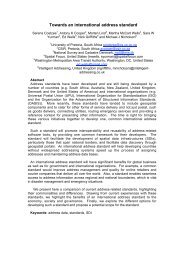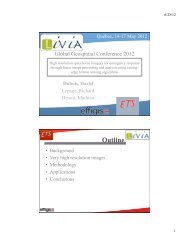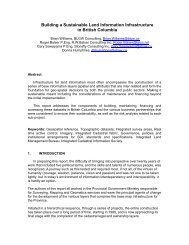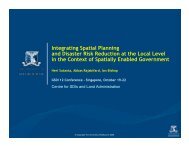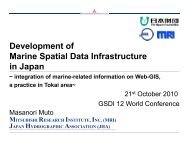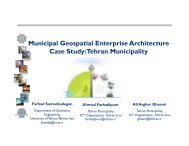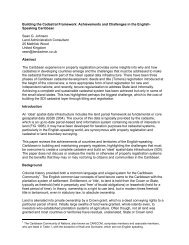SDI Convergence - Global Spatial Data Infrastructure Association
SDI Convergence - Global Spatial Data Infrastructure Association
SDI Convergence - Global Spatial Data Infrastructure Association
You also want an ePaper? Increase the reach of your titles
YUMPU automatically turns print PDFs into web optimized ePapers that Google loves.
<strong>SDI</strong>s are not for free, and thus need to be funded. Frederika Welle Donker discusses in<br />
Public Sector Geo Web Services: Which Business Model Will Pay for a Free Lunch?<br />
what business models and financial models may provide a solid financial base for public<br />
sector geographic web services. Web services are an effective way to make public<br />
sector geo-information available. They allow information to be accessed directly at the<br />
source and to be combined from different sources. Such a situation is envisaged by<br />
INSPIRE. However, the costs of web services are high and revenues do not always<br />
cover the costs. Her assessment concludes that the current business models and financial<br />
models, especially the cost recovery models, have to be reconsidered to provide<br />
sustainable funding for quality services.<br />
An issue closely related to the funding model is in enforcing and managing use rights<br />
for these services. In Standard Licences for Geographic Information: the Development<br />
and Implementation in Local Government in Italy Luigi Garretti, Silvana Griffa, Roberta<br />
Lucà and MariaTeresa Lopreiato introduce a model that is promising to satisfy some of<br />
the concerns of service providers. Web services and digital media make it easy to access<br />
information, including geographic information. Geographic information moving<br />
across digital networks may limit the power of content providers to control the use of<br />
their ‘intellectual property’. Piedmont Region, Italy, is developing a new business model<br />
for licensing geographic information. It aims to realise a complete policy guideline to<br />
regulate the use and dissemination of Piedmont’s geographic information through a set<br />
of standard electronic licences. Based on digital rights management principles, a new<br />
electronic licensing model was developed fully adhering to the INSPIRE principles. The<br />
model promotes sharing and re-use of geographic information through services.<br />
In Legal Simcity; Legislative Maps and Semantic Web Supporting Conflict Resolution,<br />
Rob Peters, Rinke Hoekstra, Tom van Engers and Erik Hupkes present an atlas service,<br />
this time focused on legislation applying to a location. Their Legal Atlas should<br />
stimulate participatory decision-making by providing answers to questions like “where<br />
will I be able to develop wasteland?” Four levels of legislation (European, national, regional<br />
and local) are assessed by Legal Atlas. Through a Simcity approach users will<br />
be able to go through the map and see per location the possibilities. The application<br />
has been successfully tested by end-users in the Dutch province of Flevoland. Legal<br />
Atlas also overcomes the difficulty of visualising temporal factors in environmental legislation,<br />
like INSPIRE, such as breeding seasons.<br />
New technological opportunities becoming reality through new services may also challenge<br />
legislative frameworks established in periods in which these services were nonexistent.<br />
Location based services, for example, now raise these new questions to privacy<br />
legislation. In Power and Privacy: the Use of LBS in Dutch Public Administration,<br />
Charlotte van Ooijen and Sjaak Nouwt assess how the use of location-based information<br />
about citizens in public administration, such as road pricing systems may affect the<br />
meaning of citizenship by shifting the information and the power relationship between<br />
government and citizens. The authors explored three cases of LBS in Dutch public administration<br />
and argue that LBS may affect the balance between the roles citizens can<br />
have in their three relationships with government: (1) as subject of the state, (2) as client<br />
of the state and (3) as citoyen (partner of the state). LBSs increase governments’<br />
knowledge of whom is where at what moment, and the underlying technologies may<br />
also influence the level of control of whom goes where at what moment. The authors<br />
conclude that the right to privacy exists in public places where citizens can be monitored<br />
and information about them collected. When interacting with citizens, government<br />
should be aware of the conflicting values of the subject, citoyen and client role to avoid<br />
extremes such as Big Brother scenarios.<br />
3



